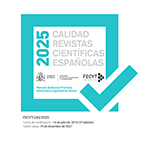Causes intervening in pupil’s motivation for language learning: the teacher’s thought
Abstract
This article shows the opinion of teachers from several educational scopes on the personal, academic and methodological causes which intervene in pupil’s motivation within the language teaching-learning process. The starting hypothesis is that the apprehension originated by a new language-culture generates certain emotional movements on the learner which influence the motivation the students have on learning a language. Also the interest shown by the teacher on such factors as well as the knowledge on their operating ways may improve the teaching-learning process. The results guarantee the important role played by the contexts where the learner is immersed when developing the motivation both the social and cultural environment – family, friends- as well as the classroom context –the group of students and particularly the teacher’s attitude, personal teaching style, strategies to promote interaction and determination to promote empathy between him and the group of students, being able to modify the interests, needs or even individual’s skill-. In a similar way, they verify that learning another language-culture requires the student’s participation in the classroom activities, putting their linguistic ego at risk, i.e. facing the possibility of making mistakes which may affect their motivation. Furthermore, it involves the recognition of other ways of thought, which requires the learner to modify acquired schemes and to apprehend others.Downloads
Article download
License
In order to support the global exchange of knowledge, the journal Didáctica. Lengua y Literatura is allowing unrestricted access to its content as from its publication in this electronic edition, and as such it is an open-access journal. The originals published in this journal are the property of the Complutense University of Madrid and any reproduction thereof in full or in part must cite the source. All content is distributed under a Creative Commons Attribution 4.0 use and distribution licence (CC BY 4.0). This circumstance must be expressly stated in these terms where necessary. You can view the summary and the complete legal text of the licence.










